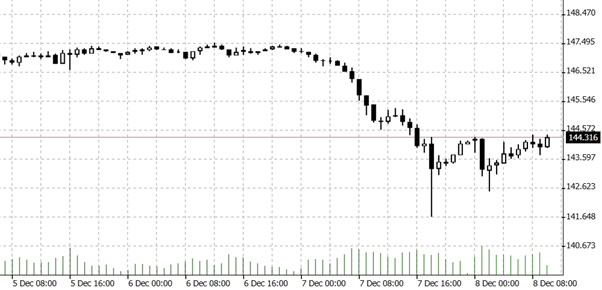

08.12.2023 – Now it really is coming, the turnaround in Japanese monetary policy. Or was it just another false alarm? Either way, unusually hawkish comments from the Bank of Japan (BoJ) have catapulted the yen upwards in the meantime. Volatility has increased dramatically.
This is how energetic the forex market can sometimes be. The yen roared away to below 142 against the dollar before profit-taking set in. The picture shows the hourly chart of USDJPY.

Source: Bernstein Bank GmbH
Yesterday, the yen posted its strongest daily gain since January. Four weeks ago, the currency had hovered at around 150, its lowest level in 30 years.
The hawks have spoken
This is what happened: Kazuo Ueda, governor of the Bank of Japan, said yesterday, according to Reuters, that managing the currency would become even more difficult towards the end of the year and that the problem would continue into the new year. Ueda also met with Prime Minister Fumio Kishida. Currency traders interpreted this as a sign that the era of ultra-low or negative interest rates is definitely over – and buyers poured into the market en masse.
The deputy governor of the BOJ, Ryozo Himino, had already made similar comments on Wednesday. According to him, the end of the negative interest rate policy would only have a relatively small impact on the Japanese economy. The key interest rate in Japan is minus 0.1 per cent.
Is the turnaround finally coming?
The BOJ has scheduled its last meeting of the year for 18 and 19 December. By then at the latest, the ultra-loose monetary policy that the Nippon is the only major economy still able to afford could finally be over. “The view is growing that the BOJ will move to modify its policy soon, such as through ending negative interest rates or scrapping its yield curve control policy at its December meeting,” said Akira Moroga, Chief Market Strategist at Aozora Bank, in an interview with the business publication “Nikkei”.
Yield curve control means that Tokyo is aiming for a yield of 0 per cent for ten-year Japanese bonds, but accepts an upper level of 1 per cent. This means that the central bank is buying its own government bonds to keep prices high. Otherwise, the balance sheets of domestic companies holding Japanese bonds would implode. And this means a huge amount of freshly printed air money flows into the market, which weakens the yen.
We are curious to see whether the central bank will finally dare to make an official U-turn. Or whether hesitation and procrastination will be the order of the day again. Whether long or short – Bernstein Bank wishes you successful trades and investments!
_____________________________________________________________________________________________________________
The content of this publication is for general information purposes only. In this context, it is neither an individual investment recommendation or advice nor an offer to purchase or sell securities or other financial products. The content in question and all the information contained therein do not in any way replace individual investor- or investment-oriented advice. No reliable forecast or indication for the future is possible with respect to any presentation or information on the present or past performance of the relevant underlying assets. All information and data presented in this publication are based on reliable sources. However, Bernstein Bank does not guarantee that the information and data contained in this publication is up-to-date, correct and complete. Securities traded on the financial markets are subject to price fluctuations. A contract for difference (CFD) is also a financial instrument with leverage effect. Against this backdrop, CFD trading involves a high risk up to the point of total loss and may not be suitable for all investors. Therefore, make sure that you have fully understood all the correlating risks. If necessary, ask for independent advice. CFDs are complex instruments and are associated with the high risk of losing money quickly because of the leverage effect. 68% of retail investor accounts lose money trading CFD with this provider. You should consider whether you understand how CFD work and whether you can afford to take the high risk of losing your money.7
